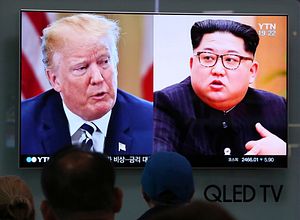The run-up to the highly anticipated meeting between North Korean leader Kim Jong-un and U.S. President Donald Trump – scheduled for June 12 – has become especially turbulent in the final days of May.
America’s reality star president has injected high-stakes diplomacy with an unnecessary dose of uncertainty. His decision on Thursday to call off the summit appears to not have stuck.
After an unusually placative dispatch from North Korean vice-foreign minister Kim Kye-gwan following Trump’s surprise letter, which caught even U.S. allies South Korea and Japan by surprise, the United States appears to be willing to return to the negotiating table.
Kim’s statement, released on Friday, showed that North Korea has picked up on the secrets to winning over Trump. After expressing sadness over the abrupt cancellation, Kim said North Korea had “even inwardly hoped that what is called ‘Trump formula’ would help clear both sides of their worries and comply with the requirements of our side”.
North Korea is not known for its facility with flattery, but Kim’s statement appears to have worked in restoring momentum towards a summit meeting. (The statement wasn’t all laudation for Trump; it also included a backhanded assessment that the U.S. president may simply have lost his nerve.)
After the North Korean statement, Trump shifted gears. “We’ll see what happens. We are talking to them now,” he said. “They very much want to do it. We’d like to do it. It could even be the 12th.”
As the United States and North Korea enter what appears to be the final stretch for a still-possible rendezvous in Singapore in a little over two weeks’ time, Washington must keep its eye on the ball and see North Korea as it is – not as it would like it to be.
The reasons for Trump’s decision to cancel the summit in the first place are complex, but chief among them are the sky-high expectations the United States had set around the denuclearization issue and a stubborn refusal by the administration to accept anything other than the unattainable objective of North Korea’s complete, verifiable and irreversible denuclearization in one big deal.
In his statement, Kim made the core of North Korea’s negotiating position clear, reiterating what he had said in a May 16 statement lashing out at Trump’s national security adviser, John Bolton.
Seeking to undercut an earlier statement by vice-minister Choe Son-hui – the one Trump cited in his decision to cancel the summit – Kim said that Choe’s statement was “just a reaction to the unbridled remarks made by the U.S. side which has long pressed the DPRK unilaterally to scrap nuclear program ahead of the DPRK-U.S. summit.”
The implication was clear: North Korea will not come to the table to discuss a one-sided denuclearisation process where it disarms itself at the behest of the United States in exchange for sanctions relief and other economic favours.
Even with the summit seemingly back on the rails for June 12, it’s far from clear that the administration has absorbed that message. There’s a possibility yet that Trump’s leap-without-looking reality television-style high-stakes diplomacy could yield a good deal, if not a perfect one, but the U.S. continues to find itself bogged down with unrealistic expectations, setting the stage for failure in Singapore.
This article first appeared at the South China Morning Post. It is republished here with kind permission.
































